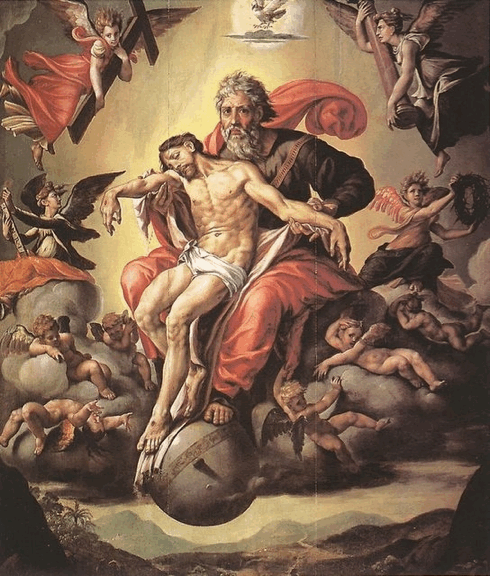
So far, we’ve established that something is created from nothing if it’s produced without any pre-existing ingredients (see this one for a quick summary). Arius, for his part, believes that the Son is produced in just this way. In this post, I want to start looking at Arius’ argument for this conclusion.
Very little of what Arius wrote has survived, so it’s hard to say with any certainty what the details of his position actually are. Apparently, he authored a long poem (or maybe it was a hymn) called the Thalia, but only a few chunks of this have survived. Arius also wrote letters, three of which have survived in their entirety, and Arius makes his clearest statements about how the Father produces the Son in these letters.
His position starts from the assumption that there is only one Unproduced Producer. However many beings there might be in the universe, only one of them is Unproduced. All the others are produced by something else.
Now, I don’t know why Arius believes this. Perhaps he knew of (or worked out himself) a philosophical argument for this conclusion, or maybe he just wanted to be a good monotheist. He doesn’t say. All we know is that he was firmly committed to the idea of a single Unproduced Producer.
In any case, Arius uses this idea in a particular way. He reasons that since there is only one Unproduced Producer, then for any two things, if one of them is not produced, then the other one must be produced.
This goes for the Father and Son too: if one of them is not produced, then the other one must be. They both can’t be unproduced. And obviously the Father is the one who’s not produced, so Arius concludes that the Son must be produced.
We need to be careful about what this claim amounts to. It does not follow, for example, that the Son is somehow a lesser being, or that the Son is a creature. To say that the Son is produced does not entail that the Son is created. Of course, Arius does believe that the Son is created (as we shall see), but it takes a few more steps to get to that conclusion. At this point in the argument, there is no implication that the Son is a creature.
Nor does it follow that the Son comes to exist at some particular point in time. Indeed, throughout history, various philosophers have believed that some productions are eternal. For instance, Christians believe the Son and Spirit are produced eternally, medieval Muslims like Avicenna and Averroes believe that creation is eternal, and so on. The fact that something is produced does not necessarily entail that it’s produced at some point in time.
Now, Arius sometimes says things like ‘before he was begotten, the Son did not exist’. That certainly makes it sound like Arius thinks the Son began to exist at some point in time, and no doubt that kind of language is part of what got Arius into trouble.
But Arius sometimes qualifies these sorts of claims by pointing out that all he means is that the Son is produced. And I think this suggests that what Arius is really trying to say is simply that the Son does not exist apart from his production. It very well may be that Arius just couldn’t seem to find a way of putting this without resorting to temporal language.
Besides, more often than not, Arius says that the Son was produced ‘before the ages’. And by that, I don’t think Arius is saying that the Son was produced, say, 5 minutes before the rest of creation. I think he means to say, as in fact he does say at one point, that the Son was produced outside of or apart from time. So Arius probably believes that the Son is eternal.
Thus, when Arius says that the Son is produced and the Father is not, I think that’s all he’s trying to say at this point in the argument. The point then, is only that the Son is produced, he somehow gets his being from the Father, while the Father is not produced at all.
This is a totally uncontroversial claim. All orthodox Christians maintain that the Father and Son are not two independent Gods up in heaven. As the Creeds say, the Father begets the Son, so there’s nothing controversial about saying that the Son is produced by the Father in some way or other.
The controversial stuff comes next.

Pingback: trinities - Arius and Athanasius, part 7 - Athanasius on natural procreation (JT)
Pingback: trinities - Arius and Athanasius, part 6 – Arius on the Son’s creation (JT)
Comments are closed.